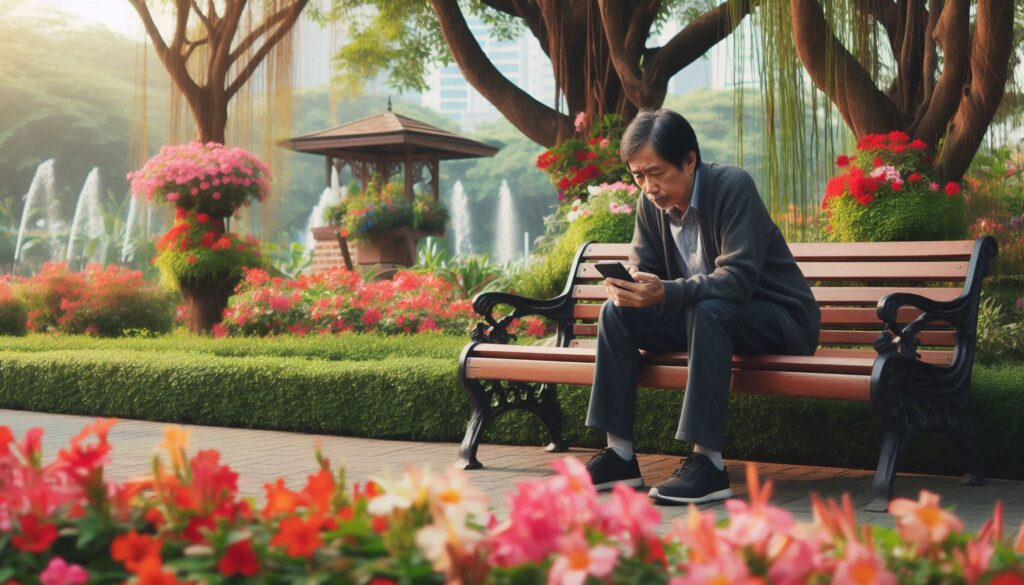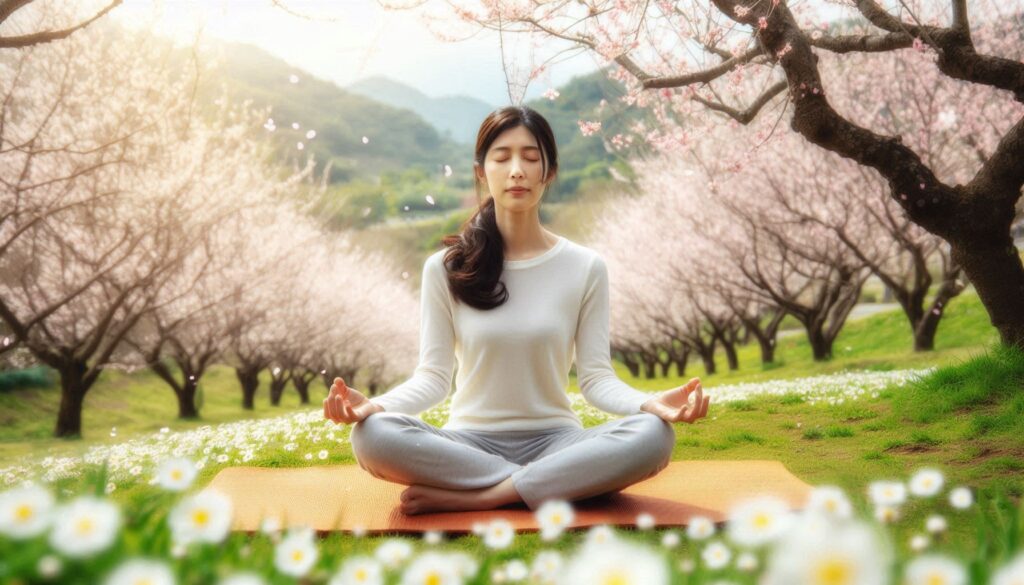- Why Do I Struggle With Being Single?
- What is Romantic Loneliness?
- Are the Objects of Our Affection Our Reflection?
- The Effects of Being Single and Lonely
- How Do I Cope With Being Single and Lonely?
- 7 Steps to Happiness and Fulfillment
- Where Do Lonely People Go to Meet People?
- Discover if You're an Authentic Dater – Free Test
- How Can I Find My True, Authentic Self?
- How Do You Show Up As Your Authentic Self in Dating?
If you’re single and lonely, is it easy to fall for a fantasy?
In a world that celebrates couples, when singles seek love, they can skip the bar-hopping, parties, and dating apps.
For instance, the object of one Japanese man’s affection is an avatar. Unable to find real love, he became obsessed with a blue-haired animated pop star and held a marriage ceremony, though the union is illegal. He says the life-size doll has strengthened his mental resolve and confidence in his lifestyle. He identifies as “fictosexual” and heads a movement to promote relationships with fictional characters.
In Japanese Otaku culture, this waifuism isn’t uncommon. Their entertainment industry supports it through animations and dating sims (romantic simulation games). But waifuism often focuses on women’s looks, leading to criticism for sexually objectifying females.
And with rampant spending and isolation, a love for things isn’t too unusual in the Western world, either.
Why Do I Struggle With Being Single?
Especially since the COVID-19 pandemic, more of us experience loneliness. U.S. Surgeon General Vivek Murthy has declared widespread social isolation a public health threat. Further, compared to two in ten married adults, nearly four in ten singles report feeling lonely on a weekly basis.
A study comparing U.S. and Korean students found that the Americans felt more romantically lonely than the Koreans.
In Western culture, happiness is often tied to acquiring material possessions. Some view love partners as just another item to acquire for fulfillment or to signify success.
According to licensed clinical psychologist, mental health researcher, and Mentalyc writer Dr. Ehab Youssef, being single can be tough because many cultures suggest happiness comes from being in relationships.
“One client told me they felt like something was ‘wrong’ with them for being single, even though they had a rich, fulfilling life in many other areas.” He noted that societal pressures can make people feel inadequate, prompting them to confront insecurities about their self-worth, which can be tough to navigate.
I’m among those who have fallen for the notion that a love partner is as essential as a home or a car. Without one, I could be thought to be missing something. Though owning a home or a car can bring convenience, we can still find happiness without them. Similarly, a partner might seem to complete us, but like a smartphone, they can’t make us happy. The joy we associate with them can be fleeting.
Research in Colorado and Texas shows that experiences bring more happiness than material things. The joy of a weekend getaway with friends or seeing a sunset at the Grand Canyon leaves a lasting warmth that a new gadget or an outfit can’t match.
Later, I’ll share advice on how to cope with being single by choice or circumstance. For now, let’s explore more reasons why people can feel single and lonely.

What is Romantic Loneliness?
Romantic loneliness can occur when it seems like everyone else has someone to hold, and affects people in and outside of relationships.
Since the 1970s, U.S. marriage rates have dropped by nearly 50 percent. People stay single for various reasons, including:
- Personal choice (e.g., preferring solitude or a career focus)
- Outside circumstances (long working hours, caring for family, difficulty finding a partner, etc.)
- Self-blame or personal deficits (low self-esteem)
- A desire for independence from traditional partnership norms
For much of my adult life, I’ve been single for reasons like:
- Life circumstances
- Choice: working at home; choosing the wrong partner or not finding the right mate
- Personality/self-esteem issues: lifelong shyness or introversion
The hours or days some of us spend in front of screens can deepen feelings of isolation. Smartphones, tablet PCs, and apps have hooked people like heroin, normalizing the use of devices for work or entertainment. Those who disengage can be seen as odd, leading to a herd mentality where users prioritize fitting in over their happiness.
It’s understandable that some seek love or friendship through devices. AI chatbots like Paradot and Replika let users interact with digital avatars that look and sound human, filling a void for the lonely.
Some see AI chatbots as helpful for the lonely and single as they can mimic and practice real-life conversations and build confidence for human interactions. Others fear the users can depend on the apps, opting to interact with them more than people, fostering isolation and loneliness. The apps are also not licensed therapists. And they might not be suitable for users with serious mental health issues, especially children whose brains are still developing.
A lawsuit claims a 14-year-old’s suicide was influenced by his attachment to a Character.AI chatbot, which reportedly engaged in sexually suggestive conversations and allegedly encouraged his suicidal thoughts. The case raises concerns about the effects of AI technology on youth, particularly the lack of safeguards for chatbots marketed as companions.

Are the Objects of Our Affection Our Reflection?
As users swipe for a perfect fit, online dating has become less like finding love and more like shopping for a pair of jeans.
A 2019 study highlights this behavior: throughout their online dating experiences, profile acceptance rates for single, heterosexual users age 18 to 30 decreased. Over time, they became pickier about others’ photos and more doubtful about their chances for acceptance.
The researchers concluded that, like store shelves lined with cereals, we face more options than ever. With almost unlimited access to potential partners, over time, people can “close off” from dating opportunities. As they swipe past profiles, they can become emotionally detached, seeing them more like things than people.
Dr. Youssef said the commoditization of online dating is an issue his clients discuss often. They feel like people are reduced to photos and short bios and the process becomes almost like “shopping” for a partner.
“I’ve had clients express frustration that swiping through profiles feels impersonal and disconnected from real human interaction.” It can sometimes lead them to become overly selective or dismissive, focusing on surface traits instead of qualities that sustain relationships. He suggests slowing down and remembering that each profile represents someone with unique stories and experiences.
A viral TikTok video of “the shortest date ever” exemplifies the superficiality some online daters face.

The Effects of Being Single and Lonely
Dr. Youssef said he has seen clients struggle with sadness, anxiety, and depression from feeling disconnected from romantic relationships. One client described romantic loneliness as “feeling like you’re on the outside looking in,” which can lead to feelings of rejection and self-doubt. Over time, negative thoughts and lower self-esteem can make it harder to connect with others meaningfully.
Singles can feel more dejected around major holidays or events that celebrate couples, like New Year’s Eve and Valentine’s Day. In the U.S., about 15 million American adults — mostly young people — say Valentine’s Day affects their mental health negatively; the same study reveals that even those with partners experience similar stress at those times.
How Do I Cope With Being Single and Lonely?
First, admit you have a problem. But don’t judge yourself or blame yourself. As noted earlier, many of us are single for many reasons, whether by choice or circumstance.
Remember: you’re not alone. In 2011, the most recent year with figures from 110 countries, the United Nations estimated over 1.2 billion people age 15 and older were single — more than North America’s entire population. (This figure doesn’t include major countries like China, India, and Russia.) In 2022, the U.S. Census Bureau estimated that 132.3 million Americans age 15 or older were unmarried (never married, divorced, or widowed).
One of the best ways to cope is to avoid dwelling on the negative. Whether you resolve your romantic loneliness or not, seek to relieve it, even if it’s only temporary. Despite our circumstances or choices, things can change.
“Coping with romantic loneliness starts with self-compassion. I’ve encouraged many of my clients to focus on building a relationship with themselves first.”
~ Licensed Clinical Psychologist, Mental Health Researcher, and Mentalyc Writer Dr. Ehab Youssef
Seeking support can help. It doesn’t need to cost money or take effort. To fill your life with love, Dr. Youssef suggests pursuing hobbies, personal growth, volunteering, or deepening bonds with friends and family.
“Journaling, therapy, and self-reflection can help you explore your values, interests, and what really makes you happy,” Dr. Youssef said. “One client told me that they started focusing on the things they loved but had let go of in past relationships, like painting and traveling.”
7 Steps to Happiness and Fulfillment
To combat occasional feelings of romantic loneliness and isolation, I’ve found the following strategies helpful. They can help you, too:
- Strengthen existing ties: Keeping in touch with friends, family, and acquaintances has given me a greater sense of belonging and purpose. Reconnect with people you like. Send a message, book a coffee date, or have a meaningful conversation. Regular communication reminds you you’re not alone and bolsters your emotional bonds.
- Create opportunities for connection: Rediscover hobbies or interests you’ve set aside and explore them with others. Join a local club or group to meet like-minded people. Forming a MeetUp walking group has boosted my confidence and helped me feel more connected.
- Express yourself: Doing art or journaling your thoughts and feelings can be therapeutic. Try listing five things you’re thankful for daily — big or small — like good health or someone’s compliment. These practices have brightened my perspective, helping me manage occasional bouts of sadness.
- Date yourself and be your own best friend: Go for a walk, go shopping, or enjoy dinner or a movie solo. Learning to like your own company can boost your mood and self-assurance.
- Focus more on others: Acts of kindness like helping someone, sharing a laugh, or giving a genuine compliment can foster a sense of connection and purpose. Brightening someone else’s day often brightens yours, too.
- Do things you love: Engaging in activities you enjoy like playing games or reading can bring moments of peace and happiness. For me, that includes documenting family history and baking sweets. Hobbies also help you stay present.
- Reconnect with your true self: Practices like meditation, self-reflection (like journaling), and mindfulness or self-awareness can help you detach from negative thoughts. These moments of introspection leave me feeling grounded and more in tune with what matters to me.
Mindfulness can be particularly helpful if, like me, you’re susceptible to ruminating over problems. Dr. Youssef noted a client found comfort in mindfulness techniques, which let them stay present and appreciate their life instead of constantly feeling like something was missing. Focusing on each of your five senses — what you see, hear, taste, touch, or smell — takes you outside of yourself.
To some extent, talk therapy, especially after a breakup, helped me understand my issues and shift my perspective. Therapy that helps you dig to the root of problems can be beneficial. Breathwork and similar “physical distancing” methods can also help.
Some studies suggest venting negative emotions like anger often can reinforce those feelings; I’ve seen this in myself and others. Ruminating about upsets can produce similar outcomes. Sometimes it’s better to do rather than stew, understand your feelings, or practice forgiveness; this helps you broaden your perspective.

Where Do Lonely People Go to Meet People?
We can all find our tribe and rebuild our social circles, which can help us meet the right mates. It also reduces regrets over being single.
Simple ways to connect
- Call or visit a friend, a loved one, or a neighbor — talk rather than texting.
- Volunteer or take a class.
- Join communities or support groups.
Some singles miss physical touch. To relieve these feelings, you can:
- Hug a friend or a loved one with their permission. Not everyone likes hugs, so if you’re not sure, ask first.
- Get a therapeutic or non-intimate massage.
- Enjoy a manicure or a pedicure.
- Consider a professional cuddle.
- Get a pet or volunteer at an animal shelter.
- Learn to dance or do martial arts.
How Can I Find My True, Authentic Self?
Dr. Youssef said that when you feel single and lonely, finding your authentic self often starts with self-reflection. He noted that many of his clients have used their time being single to reconnect with who they are outside of a relationship. This journey isn’t just about preparing for a future partner; it’s about discovering what makes you feel whole.
We can also love ourselves by accepting our flaws and not worrying too much about what others think. This self-acceptance lets us be our true, authentic selves, though achieving this can be challenging.
Start through showing compassion for yourself whenever negative self-talk arises, like when you’re ashamed of a picture of yourself. Remember that looks aren’t everything; who we are inside enhances our beauty.
Also, try to reframe your situation. Consider that others have experienced worse situations. For example, as singles, we’re free from the struggle to survive an abusive relationship.
Saying affirmations or personal mantras can combat negative thoughts. They can go beyond looking in a mirror and saying “I love you,” though that can help. You can adapt them to certain insecurities or situations.
Examples:
- I am beautiful.
- I am loved and radiate love. I am attracting the right mate.
- I have value and don’t need anyone’s approval to make me worthwhile.
Authenticity sinks more than skin deep. Philosopher Martin Heidegger emphasized the importance of noting our limited lifespans. With this awareness, we can make decisions based on what matters to us rather than following others’ beliefs. This mindset grounds us and connects us to our true selves, without the need to mask our feelings or play roles.
Many spiritual traditions like Sufism and Gnosticism espouse that everyone contains a divine essence — a spark from a higher force that ties us to something greater. We can awaken this inner light through practices that surpass our egos and the illusion of separation from the divine. Common methods include meditation, love, and remembrance of the divine, all aimed at purifying the heart, helping us truly know ourselves and feel connected to everything.
Through practicing these philosophies, I feel more grounded and whole.
Loving ourselves and being true to ourselves can, but might not necessarily, lead to attracting true love. But it doesn’t hurt to try.
This practice can eventually lead to embracing singlehood and its benefits. Especially if you’re not yet ready to date, the personal growth that results from the freedom to make your own choices can feel liberating.

How Do You Show Up As Your Authentic Self in Dating?
“Being your true self while dating takes vulnerability and confidence,” said Dr. Youssef. He noted that some clients fear showing their authentic selves because they’re worried they will be rejected. He stresses that authenticity is crucial for forming lasting connections. If you show a version of yourself that isn’t genuine, it will be exhausting to maintain, and ultimately, the relationship won’t feel right.
When you stay true to yourself, you can approach dating mindfully and healthily — without seeing it like you’re shopping for a partner or the need to conform to others’ views.
Said Dr. Youssef, “One client found success when they started approaching dating with the mindset of ‘I’m going to show up as myself, and if they don’t like me for who I am, they’re not the right person for me.'” That shift helped them feel less pressure and more confident.
I’m practicing this now in my life.
We’re all on our own journeys to love, whether we’re mourning the end of a relationship or a lack of companionship, dating, or happy being single. Whichever path you take, focusing on personal growth can help you rise above any roadblocks. And finding ways to move past them will likely make your travels more fulfilling.
Are you ready to join me on the journey to love?
- Why Do We Love the Way We Do? - March 14, 2025
- 5 Reasons I Believe in Mindful Dating and Why You Should Embrace Vulnerability, Too - January 19, 2025
- Single and Lonely No More: 7 Steps to Happiness and Fulfillment - November 1, 2024